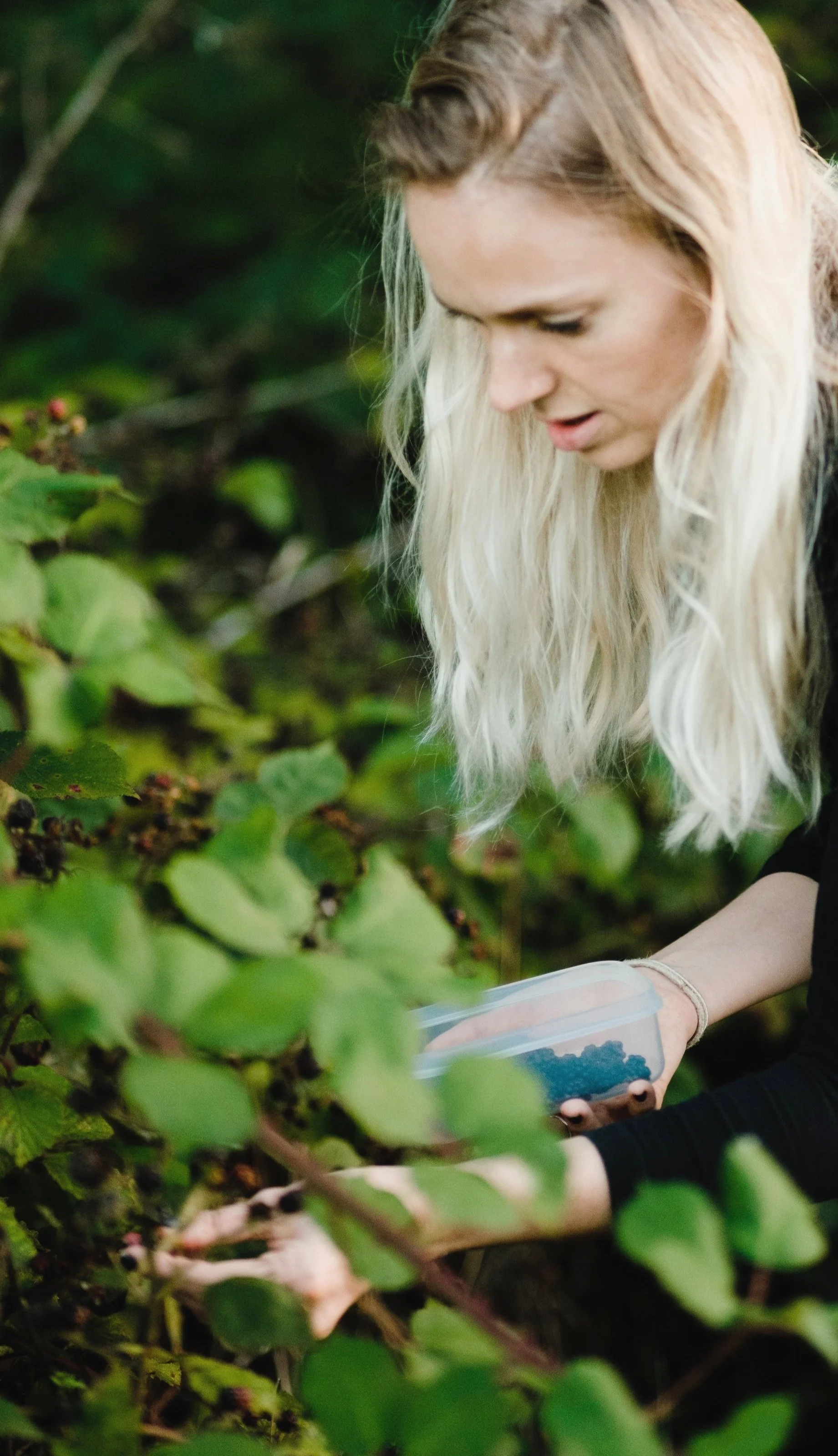Blackberries
Blackberries are rich in both history and nutrients, and are incredibly versatile in the kitchen (spoiler alert: they’re not just for sweet dishes and desserts). Learn more about them here!
Loved by different cultures - with good reason.
I shared a PSA earlier in the autumn, telling people who live in areas that have blackberries growing wild to find good spots and be ready to pick when they started ripening. Blackberries are interesting in that you can return to the same bush over quite a long time (in my experience, it can be 2 months or more!) and different parts of the bush will have ripened at different times. So just because you see some older berries on a bush, don’t necessarily think that this means it’s too late! It’s always worth returning to see if anything has developed in a week or so. And by the same token, if the berries look too young and unripe - you may want to look closer; often further up (and annoyingly hard to reach), you’ll find the berries who have enjoyed the sunshine a bit more and have ripened before the rest. When it comes to blackberries, it’s best to keep your eyes open!
Blackberries have a rich history, weaving through folklore, traditional medicine, and even early agriculture - in different parts of the world. Archaeological findings suggest that they were used as far back as 2,500 years ago, with seeds found at ancient settlements in Denmark and Italy. The berry is believed to be native to both North America and Europe, and they were highly valued by Indigenous tribes in North America and used by the Greeks and Romans in Europe. Roman soldiers and travellers reportedly relied on blackberries as a convenient food source on long journeys. Sounds like me on a hike!
In Celtic and European folklore, blackberries were sometimes seen as mystical. People believed that blackberries could ward off evil spirits and heal ailments. In Ireland, for instance, they were linked to the harvest festival of Samhain (the precursor to what we now know as Halloween), when blackberries would be the last fruit to harvest before winter.
Blackberries have been used medicinally by various cultures for centuries. The Greeks and Romans used blackberry leaf infusions to treat both fevers and mouth sores. The Cherokee people in North America used blackberry root as a remedy for digestive issues, and a traditional blackberry tea was used to ease a sore throat.
In the Middle Ages, blackberry brambles (the thorny bushes they grow on) had a reputation as protective plants. Blackberry bramble bushes were sometimes planted around property boundaries to protect against invaders.
I always love learning that different cultures have used an ingredients as a remedy, for then to learn that it truly does have some straight up fantastic nutritional properties. The blackberry is a great example of this. They rank high on the antioxidant scale - antioxidants (you’ll remember from previous articles I’m sure!) help combat oxidative stress in the body, which is crucial in reducing the risk of chronic diseases, from heart disease to certain types of cancer. Studies suggest that the antioxidants in blackberries can also benefit cognitive health. - they are thought to boost memory and focus over time.
One cup of blackberries offers nearly 8 grams of fibre — that’s about a third of the recommended daily intake! Fibre is essential for digestive health, supporting a healthy gut microbiome and regular bowel movements. Fibre also helps stabilise our blood sugar and can keep us feeling full.
Blackberries can really help with your recommended daily intake of vitamin C, which is essential for a strong immune system, healthy skin, and proper wound healing. Vitamin C also aids in the absorption of iron, so pairing blackberries with iron-rich foods can enhance nutrient intake even more. With this in mind, consider a smoothie that contains kale or spinach, or adding blackberries to savoury foods like salads or meat dishes.
Blackberries are a surprisingly good source of vitamin K, which plays an essential role in bone health. Along with vitamin C, which supports collagen production, vitamin K is important in preventing osteoporosis and maintaining strong bones. A cup of blackberries has about 30% of the daily value for vitamin K.
To get the most out of their nutritional profile, try adding blackberries to smoothies, porridge, yoghurt or salads. They’re also delicious when paired with mint, lemon, or dark chocolate for a treat! And if you’re feeling adventurous, fresh blackberry compote over grilled meats or even in a vinaigrette can add a uniquely delicious twist.
So if you were lucky enough to pick and freeze some blackberries over autumn, or even if you have to get them at the supermarket or specialist shop, I really recommend adding some to your diet. If you have a large quantity of them, you can try my healthy blackberry jam recipe! If you only have a smaller batch, try adding them to a Somerset apple cake or chickpea blondies.
Do you have access to blackberries in the wild or do you have to buy them? Post on Instagram and tag me @TheFromScratchBody and use the hashtag #TheFromScratchBody so I don’t miss it!
